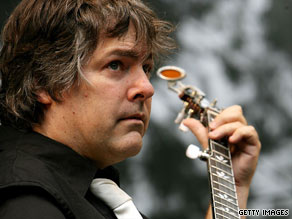CNN
MANCHESTER, Tennessee (CNN) -- When Bela Fleck told us he had been missing something in his life musically, he caught us off guard.

Bela Fleck traveled to Africa to immerse himself in banjo-related culture.
Keep in mind: Fleck is considered by many to be the premier banjo player in the world. He's won Grammy awards. He's collaborated with bluegrass musicians, jazz players, classical performers and any number of other talented artists.
But Fleck said he wanted to make himself uncomfortable.
Earlier this year, he released the documentary "Throw Down Your Heart," for which he traveled to Uganda, Tanzania, Mali, and Gambia to explore the African roots of the banjo.
CNN caught up with him backstage at the Bonnaroo music festival last month, where he played with African kora player Toumani Diabate, to discuss his film and experience in Africa and what prompted him to go. The following is an edited version of the interview. ![]() Watch Fleck at Bonnaroo »
Watch Fleck at Bonnaroo »
CNN: What gave you the inspiration to go to Africa to trace the roots of the banjo and make "Throw Down Your Heart?"
Bela Fleck: Well, I have loved the banjo since I first heard it when I was a little kid, and after I started to learn to play it I discovered that it came from Africa originally, and that doesn't seem to be common knowledge. There are a lot of people who have forgotten over the years where the banjo comes from.
I've always wanted to go back to Africa and hear what's going on there and find the instruments that still exist that are the roots of the banjo and play music with them. So that's what this trip and the film and the record were all about --going to Uganda, Tanzania, Mali and Gambia and finding musicians and filming interactions with them and recording it all.
CNN: What did you learn?
Fleck: That's a common question. Everybody wants some kind of epiphany out of a trip like this, and I got it, but it's hard to put it into words. Except that just the experience of playing with these musicians made my life a lot richer, made my worldview a lot bigger, and in a lot of cases I learned music that was so new to me that it's affected the way I play music ever since.
CNN: It's clear that learning this music and a new technique on the banjo was a challenge for you.
Fleck: Sure. Another important part of the trip for me was putting myself into uncomfortable situations and seeing how I would do, because over the years, as I've gotten more and more successful, I get in control of things, and less and less I was finding myself in situations that were truly risky musically.
I liked being unprepared and being forced to come up with it on the spot. It just wasn't happening in my life at the time.
So that was another part of going to Africa, throwing myself into completely uncharted waters and trying to do something good and survive. [There was also] the brotherhood of acoustic musicians, 'cause we feel something when we play our instruments and the sounds mingle in the air. I think it's different than playing pop music or electric instruments.
CNN: Tell us about your collaboration with Toumani Diabate. ![]() Watch the masters play »
Watch the masters play »
Fleck: I am so lucky to be performing with Toumani. He's the greatest kora player. The kora is a 21-string harp, and he comes from 71 generations from it being taught from father to son, father to son. We improvise together with just the kora and the banjo.
CNN: Did you learn how to play the kora?
Fleck: No, I haven't sat and tried to play the kora, but he's taught me the notes that he plays, the scales and the patterns that he does, and I taught him some banjo stuff. He's a great collaborator. Playing with musicians who didn't speak English was not a problem, when we started to play together, we always found a way to make music.
CNN: Is there a social message about Africa you came back with and want people to know about?

Fleck: My reasons for going to Africa were kind of selfish, because I love the banjo, and I really want to play with the musicians. But I think that the film serves in a lot of positive ways.
One of the ways is to show people that there are a lot of great things about Africa. Currently there are so many horrible things that are getting press about Africa, and they truly are horrible. But there's a reason we should care about Africa: It's a wonderful place. People are beautiful, and there is an incredible culture and history there, and I think this film sits on the other side. It's not a political statement, but it does point out what is beautiful about Africans.

 Sit tight, we're getting to the good stuff
Sit tight, we're getting to the good stuff
